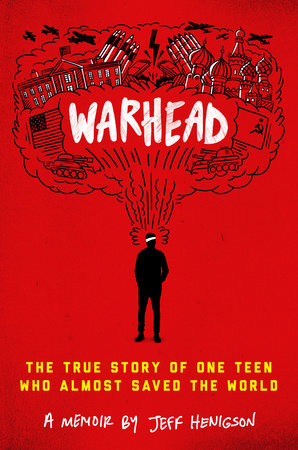Jeff Henigson, the author of the critically acclaimed young adult memoir Warhead, shares his thoughts on writing for the YA world, his process, and lets us in on a secret about an important tool every one can use to positively change the world.
Check out this Q&A with author Jeff Henigson. . .
There aren’t that many YA memoirs out there. What made you decide to write your memoir as a YA book?
At first, I didn’t! I originally wrote Warhead as an adult memoir, with flashbacks to my teen self written in what I recalled of my voice at the time. That adult version of my book was rejected by more agents than I can count! But one of them was kind enough to tell me what she felt was wrong. “Your teenage voice is absolutely compelling, Jeff,” she said. “But you as an adult are a relatively boring person.” Of course that stung a bit (my friends think it’s hilarious), but it turned out to be great advice. The young adult version quickly caught the eyes of my agent and, ultimately, Random House Children’s Books.
You went through some fascinating things as a teenager. Have you had anything equally striking happen in your adult life?
Not nearly as frightening but perhaps just as striking—it was something that reconnected me with my teen experience. It was 2008 and I was at a low point, having just split with my partner and, due to the onset of seemingly insurmountable health problems, ended my career at the United Nations. While my ex and I were going through our things, I stumbled upon on old U-Haul box with NOSTALGIA written across the top with a Sharpie. It was a box I’d sealed shut twenty years before as a teenager emerging from a long battle with brain cancer. Inside I found something extraordinary: a package of handwritten letters, all in Russian, sent to me from citizens of the Soviet Union in the summer of 1988 after they had read a story about my peace mission there earlier that year. I’d packed the letters away back then, wanting to free myself from my experience with cancer. But in 2008, those letters not only brought me back, they also ended up determining the next decade of my life—the process that ultimately led to the publication of Warhead.
Did you always know you’d be a writer one day?
Back in middle school, my English teacher told me I was destined to become a writer. Another in high school, Ms. Hamilton, who is featured in Warhead, made the same proclamation. And even as a teen I had the sense that I’d someday head in that direction. I just wanted a little life experience first. What I certainly didn’t anticipate was a three-decade-long diversion! Still, that time exploring and experiencing the world and all its richness has given me a suitcase or two full of stories.
What is your writing process like?
I think every writer develops his or her own strategies, but there are a number of common threads. It’s important to write every day. Writing is like a muscle that atrophies when not regularly exercised. Connecting with other writers is a great way to get important feedback on your project and to stay engaged. And creating space for yourself to write, away from the regular world, disconnected from your phone and your friends and other distractions, is a very important part of the writing process.
Who is your favorite author?
I can’t really say I have just one. Sometimes it’ll be just one of an author’s many books that mesmerizes me, like S. E. Hinton’s The Outsiders, which I’ve read more times than I can count. Other times I’ll fall for a series, like J. K. Rowling’s extraordinary Harry Potter universe. For memoirs, though, I loved Jean-Dominique Bauby’s The Diving Bell and the Butterfly, The Tender Bar by J. R. Moehringer, and The Glass Castle by Jeannette Walls.
If you could speak to teens around the world, what would you tell them?
I’d say that I completely understand if you’re worried about the state our world is in, whether it’s pending ecological nightmares or brewing conflicts that might lead to larger, more deadly wars or political instability at home and abroad. There’s much to be concerned about. But I’d also tell you not to forget an important tool that can guide you through this darkness: books. Step into a library or a bookstore, and you’ll find literature, sometimes centuries of it, in which humans have explored these very same challenges. Relevant, timely, and deeply important discussions about these topics have taken place in every human language and been recorded in literature across time, whether through fictional characters or analysis of the real world. Look—everywhere—and you’ll find proposed paths to a better future. Learning what has been proposed, what the collective human experience offers us, simply by reading and exploring and gathering wisdom, is a pathway to progressive change and, ultimately, to human enlightenment.


